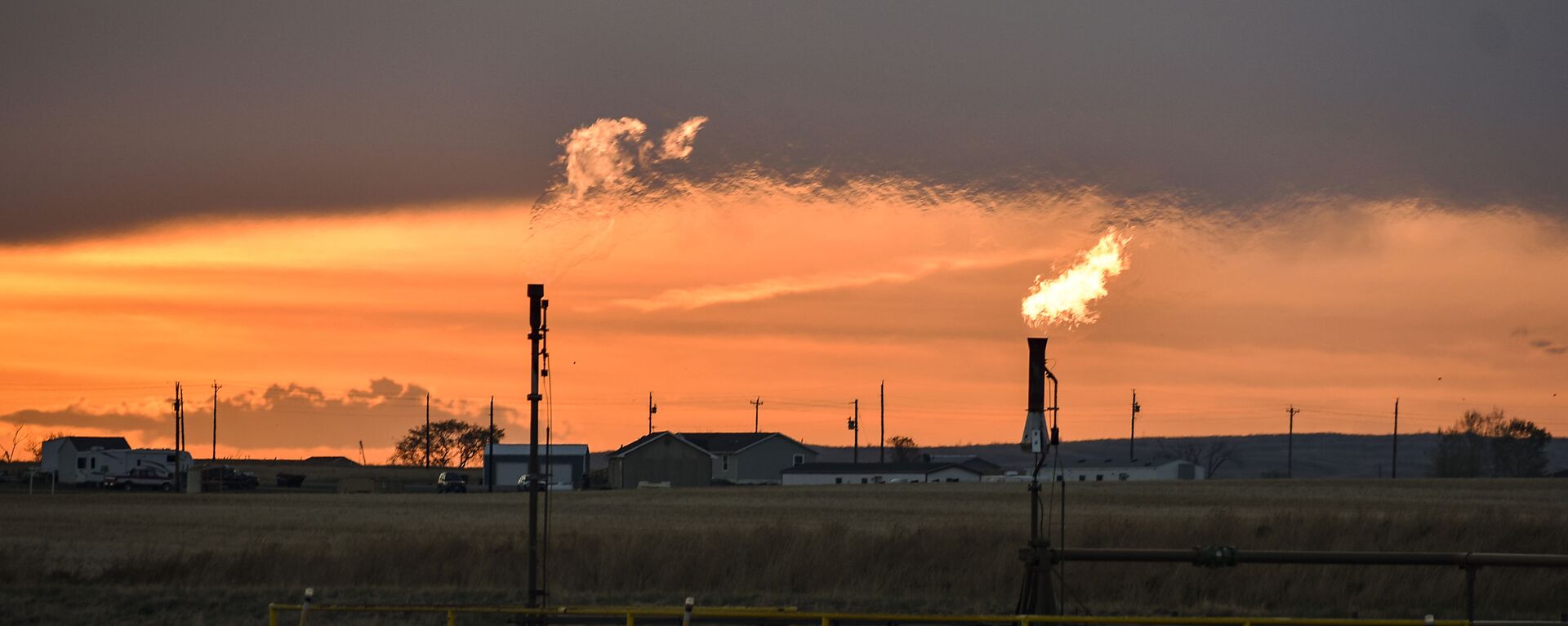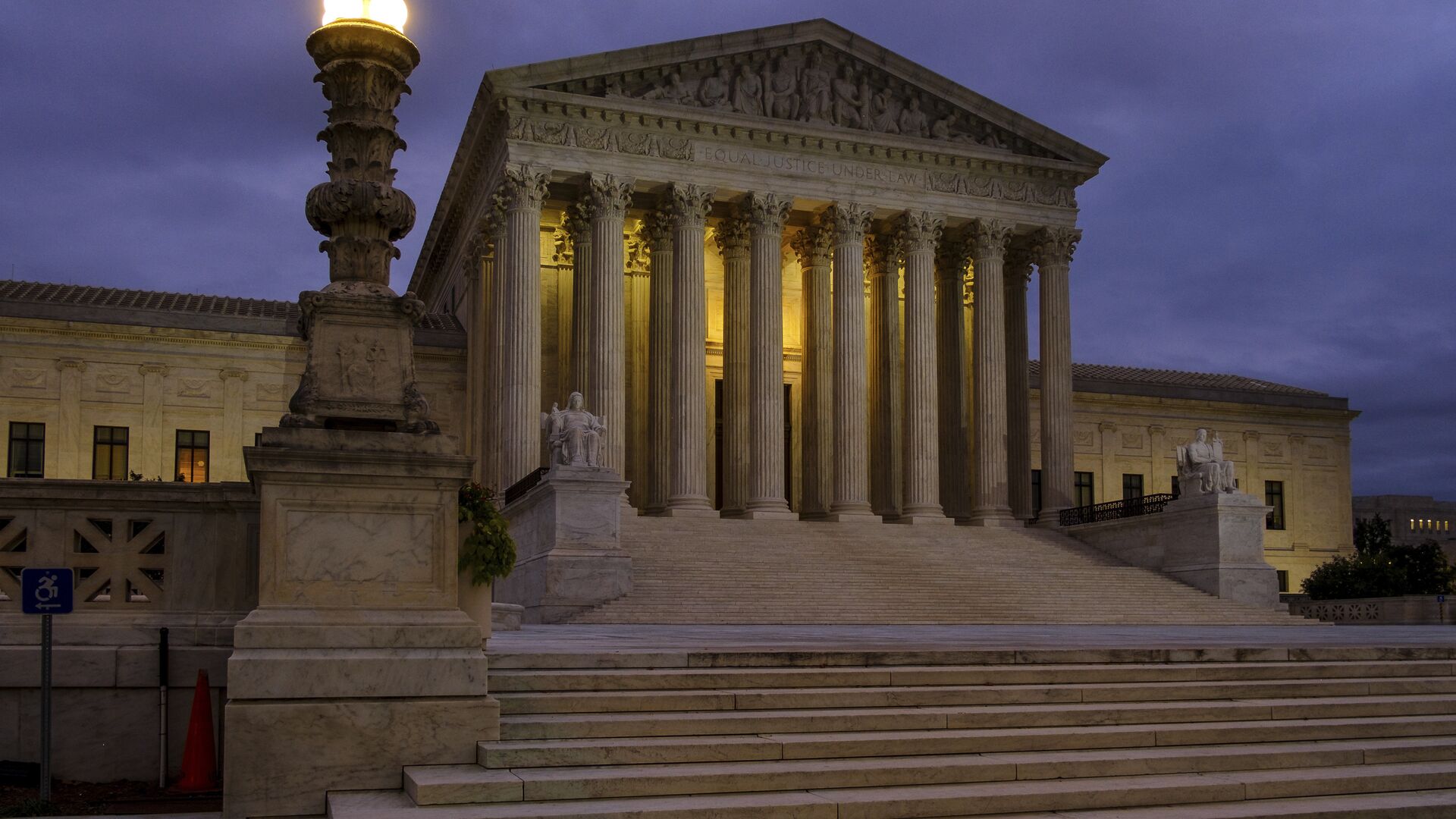https://sputnikglobe.com/20220630/us-supreme-court-limits-anti-air-pollution-law-in-major-blow-to-whs-climate-change-policy-1096838632.html
US Supreme Court Limits Use of Anti-Air Pollution Law in Major Blow to WH's Climate Change Policy
US Supreme Court Limits Use of Anti-Air Pollution Law in Major Blow to WH's Climate Change Policy
Sputnik International
The reduction of emissions, decrease in the use of fossil fuels and development of effective green energy sources are among the top priorities of Biden's... 30.06.2022, Sputnik International
2022-06-30T14:27+0000
2022-06-30T14:27+0000
2022-06-30T15:06+0000
us
climate change
environment
https://cdn1.img.sputnikglobe.com/img/106866/69/1068666910_0:274:5265:3236_1920x0_80_0_0_657f206079c57adb2e60bf7d6bd2e792.jpg
The US Supreme Court has ruled that the Environmental Protection Agency interpreted the Clean Air Act - the country's main anti-air pollution law that allows the regulation of greenhouse gas emissions - too broadly, and ordered to limit its use. Six justices deemed "conservative" supported the decision, while three "liberal" justices opposed it.The court specifically ruled that the EPA does not have the authority to limit emissions from power plants using the Clean Air Act.The decision comes as a response to an appeal by 19 states, coal companies and power plants to prevent the EPA from abusing broad authority to regulate emissions. They asked the US Supreme Court to allow them greater flexibility in phasing out emissions-intensive plants, namely coal ones so that they could provide services reliably.The ruling might undermine Joe Biden's planned efforts to propose mandatory emission reductions at power plants in the US by the end of the year. It is supposed to be the first step in the POTUS' broader plan to have the country's power generation emissions-free in 13 years.The idea of regulating power plant emissions dates back to the Obama administration and its plans to pass the Clean Power Plan that would have explicitly given the government the tools to retire emissions-intensive coal plans. The act was effectively blocked by a 5-4 US Supreme Court decision in 2016 and shelved for good under the Donald Trump administration.Regardless of the Democrats' efforts, the US power plant emissions have actually already sunk below the levels that should have been achieved only by 2030 under Obama's original plan. They were achieved thanks to closures of the very same coal plants driven by market mechanisms.
https://sputnikglobe.com/20220129/so-much-for-climate-agenda-biden-administration-issues-more-gas-oil-drilling-permits-than-trump-1092605111.html
Sputnik International
feedback@sputniknews.com
+74956456601
MIA „Rossiya Segodnya“
2022
Tim Korso
https://cdn1.img.sputnikglobe.com/img/07e6/03/0d/1093831826_0:0:216:216_100x100_80_0_0_e3f43a960af0c6c99f7eb8ccbf5f812c.jpg
Tim Korso
https://cdn1.img.sputnikglobe.com/img/07e6/03/0d/1093831826_0:0:216:216_100x100_80_0_0_e3f43a960af0c6c99f7eb8ccbf5f812c.jpg
News
en_EN
Sputnik International
feedback@sputniknews.com
+74956456601
MIA „Rossiya Segodnya“
Sputnik International
feedback@sputniknews.com
+74956456601
MIA „Rossiya Segodnya“
Tim Korso
https://cdn1.img.sputnikglobe.com/img/07e6/03/0d/1093831826_0:0:216:216_100x100_80_0_0_e3f43a960af0c6c99f7eb8ccbf5f812c.jpg
us, climate change, environment
us, climate change, environment
US Supreme Court Limits Use of Anti-Air Pollution Law in Major Blow to WH's Climate Change Policy
14:27 GMT 30.06.2022 (Updated: 15:06 GMT 30.06.2022) The reduction of emissions, decrease in the use of fossil fuels and development of effective green energy sources are among the top priorities of Biden's declared Build Back Better agenda. The latter already suffered a major blow last year when part of the legislation that was supposed to fund climate policies failed to pass Congress.
The US
Supreme Court has ruled that the Environmental Protection Agency interpreted the Clean Air Act - the country's main anti-air pollution law that allows the regulation of greenhouse gas emissions - too broadly, and ordered to limit its use. Six justices deemed "conservative" supported the decision, while three "liberal" justices opposed it.
The court specifically ruled that the EPA does not have the authority to limit emissions from power plants using the Clean Air Act.
The decision comes as a response to an appeal by 19 states, coal companies and power plants to prevent the EPA from abusing broad authority to regulate emissions. They asked the US Supreme Court to allow them greater flexibility in phasing out emissions-intensive plants, namely coal ones so that they could
provide services reliably.
The ruling might undermine Joe Biden's planned efforts to propose mandatory emission reductions at power plants in the US by the end of the year. It is supposed to be the first step in the POTUS' broader plan to have the country's power generation emissions-free in 13 years.

29 January 2022, 13:17 GMT
The idea of regulating power plant emissions dates back to the Obama administration and its plans to pass the Clean Power Plan that would have explicitly given the government the tools to retire emissions-intensive coal plans. The act was effectively blocked by a 5-4 US Supreme Court decision in 2016 and shelved for good under the Donald Trump administration.
Regardless of the Democrats' efforts, the US power plant emissions have actually already sunk below the levels that should have been achieved only by 2030 under Obama's original plan. They were achieved thanks to closures of the very same coal plants driven by market mechanisms.



